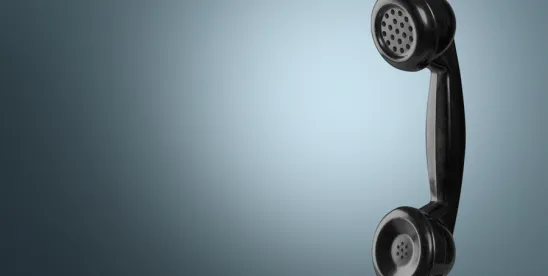We all get them. Repeated marketing calls to our mobile and home phones with the incoming phone number altered to make it appear that it’s a local call, when in fact, the call is from a robo-scammer using IP technology to “spoof” the phone number. As it turns out, there’s a federal law that makes such spoofing illegal, the Truth in Caller ID Act of 2009 (“TICIDA”), and in its first enforcement action under TICIDA, the FCC hit an alleged serial robocaller, Adrian Abramovich and his companies (together, Abramovich) with a whopping $120 million Notice of Apparent Liability for allegedly originating nearly 100 million such calls.
The Commission also issued a Citation and Order to Abramovich for alleged violations of the Telephone Consumer Protection Act (“TCPA”) for making unauthorized prerecorded telemarketing calls to emergency phone lines, wireless phones and residential phones without obtaining the required prior express written consent from the called party. While TICIDA allows the Commission to directly fine first-time violators through its NAL authority, which it did here, in TCPA FCC enforcement actions involving entities and individuals that do not hold Commission authorizations, the Commission must first issue a citation, and then can only proceed with a fine if the recipient repeats the violation. That still leaves Abramovich open to potentially monumental TCPA class action exposure. The Citation and Order also notified Abromovich that he had violated the federal wire fraud statute by transmitting or causing to be transmitted, by means of wire, misleading or false statements with the intent to perpetrate a fraud.
According to the Commission, Abramovich ran a scheme where his spoofed calls appeared to originate from local numbers and offered, via a pre-recorded message, holiday vacations and cruises claiming to be associated with well-known American travel and hospitality companies. The pre-recorded messages would prompt customers to “press 1” to secure their reservation. Once a customer pressed “1”, the customer was transferred to a call center where live operators pushed vacation packages typically involving timeshare presentations, that were not affiliated with the well-known brands used in the recorded messages. The Commission characterized Abramovich’s schemes as “one of the largest – and most dangerous – illegal robocalling campaigns the Commission has ever investigated.” According to the Commission, in addition to defrauding consumers, the robocalling campaign also caused disruptions to an emergency medical paging service, which provides paging services for emergency room doctors, nurses, emergency medical technicians, and other first responders.
While significant in absolute terms, the $120 million proposed fine, according to the Commission, was significantly below the penalty that could have been proposed in the NAL. Rather than fine the statutory maximum of $11,052 for each spoofing violation, or three times that amount for each day of a continuing violation, the Commission calculated the base forfeiture amount at $1,000 per unlawful spoofed call, since this was the first time the Commission used its TICIDA forfeiture authority.
Mr. Abromovitz now has an opportunity to respond to both the NAL and Citation. Stopping illegal robocalling has been a key priority for Chairman Pai, and no doubt the Commission is expecting that the threat of huge monetary forfeiture penalties against the industry will provide a powerful incentive for roboscammers to look for other ways to make a buck. Given the Commission’s struggle with fashioning tools to go after serial robocallers that do not have the effect of increasing TCPA exposure for established companies engaging in legitimate customer communications, we do not expect the Commission to back down from its proposed penalty, and expect this to be the start of a new enforcement initiative using TICIDA and its direct penalty provisions.




 />i
/>i

